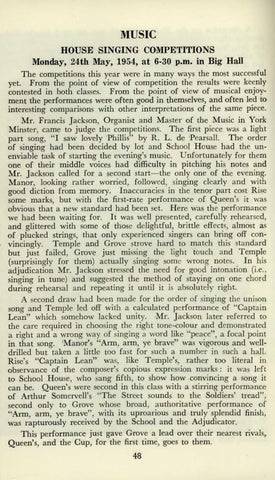MUSIC HOUSE SINGING COMPETITIONS Monday, 24th May, 1954, at 6-30 p.m. in Big Hall The competitions this year were in many ways the most successful yet. From the point of view of competition the results were keenly contested in both classes. From the point of view of musical enjoyment the performances were often good in themselves, and often led to interesting comparisons with other interpretations of the same piece. Mr. Francis Jackson, Organist and Master of the 'Music in York Minster, came to judge the competitions. The first piece was a light part song, "I saw lovely 'Phillis" by R. L. de Pearsall. The order of singing had been decided by lot and School House had the unenviable task of starting the evening's music. Unfortunately for them one of their middle voices had difficulty in pitching his notes and Mr. Jackson called for a second start—the only one of the evening. Manor, looking rather worried, followed, singing clearly and with good diction from memory. Inaccuracies in the tenor part cost Rise some marks, but with the first-rate performance of Queen's it was obvious that a new standard had been set. Here was the performance we had been waiting for. It was well presented, carefully rehearsed, and glittered with some of those delightful, brittle effects, almost as of plucked strings, that only experienced singers can bring off convincingly. Temple and Grove strove hard to match this standard but just failed, 'Grove just missing the light touch and Temple (surprisingly for them) actually singing some wrong notes. In his adjudication Mr. Jackson stressed the need for good intonation (i.e., singing in tune) and suggested the method of staying on one chord during rehearsal and repeating it until it is absolutely right. A second draw had been made for the order of singing the unison song and Temple led off with a calculated performance of "Captain Lean" which somehow lacked unity. Mr. Jackson later referred to the care required in choosing the right tone-colour and demonstrated a right and a wrong way of singing a word like "peace", a focal point in that song. Manor's "Arm, arm, ye brave" was vigorous and welldrilled but taken a little too fast for such a number in such a hall. Rise's "Captain Lean" was, like Temple's, rather too literal in observance of the composer's copious expression marks : it was left to School House, who sang fifth, to show how convincing a song it can be. Queen's were second in this class with a stirring performance of Arthur Somervell's "The Street sounds to the Soldiers' tread", second only to Grove whose broad, authoritative performance of "Arm, arm, ye brave", with its uproarious and truly splendid finish, was rapturously received by the School and the Adjudicator. This performance just gave Grove a lead over their nearest rivals, Queen's, and the Cup, for the first time, goes to them.
48
